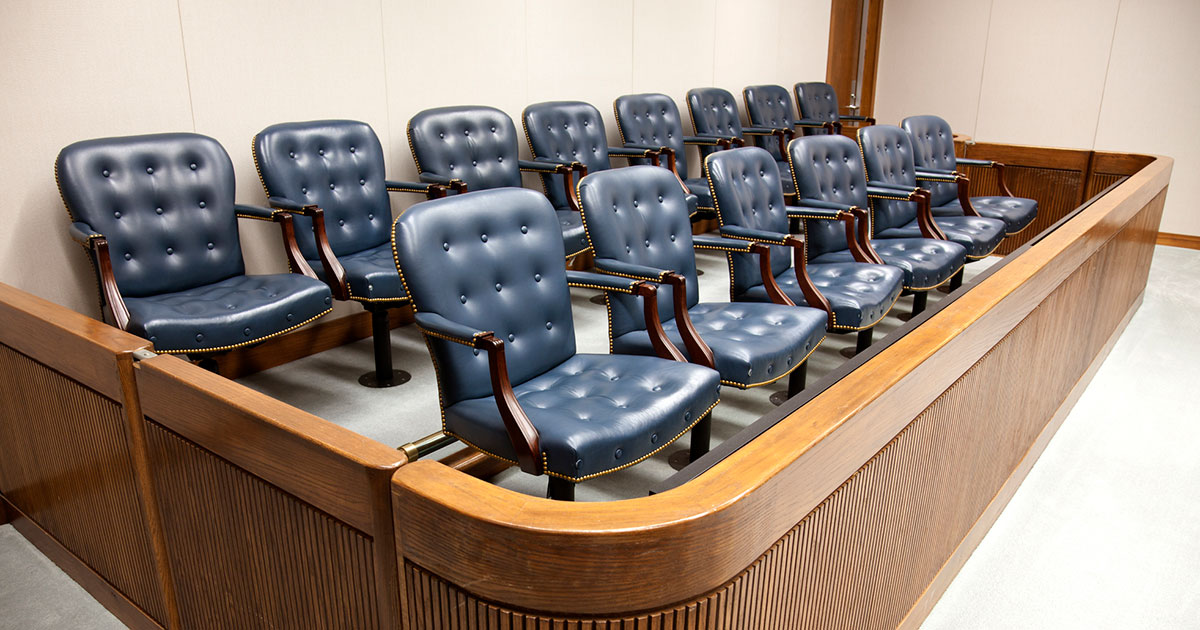
June 19, 2024 – Fifty years ago, civil jury trials were a regular and often defining feature of a young attorney’s practice.
From slip-and-falls to car crashes to injuries caused by consumer products, a broad cross-section of marketplace interactions came under examination by six- and twelve-member panels of ordinary citizens, each tasked with weighing evidence, apportioning fault, and fixing damages.
Civil jury trials offered attorneys a chance to cut their teeth while shaping the state’s common law. But over the last 30 years, the number of civil jury trials in Wisconsin and across the nation has plummeted.
According to the
state court system’s website, in 2013 there were 2,103 civil jury trials out of 359,009 total civil dispositions (.006%). In 2023, there were 112 civil jury trials out of 141,633 total dispositions (.0008%) – a decrease of 86%.
The trend isn’t limited to Wisconsin. Among the nation’s 94 federal district courts, there were 4,765 civil jury trials on the merits in 1990 and 1,758 civil jury trials on the merits in 2016 – a
decrease of 63%.
“I think we may have more Sasquatch sightings in the Northwoods than we do jury trials these days,” said Ed Robinson, a plaintiffs’ attorney with Cannon & Dunphy S.C. in Brookfield.
The Rise of ADR

“Where are we getting our young attorneys trials, because there are so many fewer trials?” – Heather Nelson, President, The Everson Law Firm
One reason for the decline is the rise of alternative dispute resolution (ADR), said Heather Nelson, a defense lawyer with The Everson Law Firm in Green Bay.
“Most judges require mediation,” Nelson says. “It gets people in a room to discuss things like cost and likelihood of resolution.”
Robinson said that most circuit court judges in the state take advantage of the discretion granted them under
Wis. Stat. sections 802.10(3)(i) and
802.12 and require the parties to attempt mediation before setting a trial date.
Section 802.10(3)(i) authorizes a circuit court judge to include in a scheduling order “[t]he advisability of ordering the parties to attempt settlement under section 802.12.” Section 802.12 defines several types of ADR.
“We are blessed in Wisconsin with a large number of excellent mediators,” Robinson said. “Because they’re so good at their jobs, many cases that would otherwise go to trial are being resolved through mediation.”
Discretion Versus Valor
Increasingly risk-averse clients are another reason for the decline in civil jury trials.
“I think insurance companies have gotten more regimented in their analysis of risk,” Nelson said.
Nelson, the incoming president of Wisconsin Defense Counsel, said that stance is in part driven by new tactics adopted by plaintiffs’ attorneys.
As examples, Nelson cited a rise in bad-faith insurance claims and increasing attempts to use
section 628.46, the timely-payment-of-claims statute.
According to Nelson, plaintiffs’ attorneys have begun arguing the statute should apply to third-party claims such that if third parties don’t pay by a certain date, they’re subject to prejudgment interest – an argument that, if successful, increases the potential costs of losing at trial.
Nelson also cited reports of “nuclear verdicts” – those amounting to $10 million or more – as whetting defendants’ desire to avoid trial.
Such large verdicts are aberrations, Nelson said. Still, “that news gets around, and I think sometimes that makes insurance companies concerned about what would happen if they don’t settle the case,” she said.
‘They Don’t Want to Roll the Dice’

“I think we may have more Sasquatch sightings in the Northwoods than we do jury trials these days.” – Edward Robinson, Cannon & Dunphy S.C.
Trial is becoming a less appetizing choice for injured plaintiffs too.
“Most of our clients are risk averse,” Robinson said. “Unless I can give them some sort of statistical probability of beating the offer at trial, when you ask them, ‘If we turn down the offer and we go to trial and we come up short, would you be disappointed?’ most answer ‘Yes.’”
Occasionally, a plaintiff will demand her day in court, for the opportunity to tell her story to a jury.
“But that’s a small percentage of my clients,” Robinson said. “Most are practical folks and if I can’t guarantee them that the outcome will be better, they don’t want to roll the dice and go to trial.”
The cost of a trial also gives plaintiffs pause, Robinson said.
Physicians charge anywhere from $1,500 to $3,000 for appearing for a deposition. If the case goes to trial, they charge additional fees for their time spent on trial prep and on testifying. Those are costs that, under the American system, a plaintiff must bear – win or lose.1
“Even in a simple motor vehicle collision case, where we’re only having to call a treating physician to testify about our client’s injuries and we don’t have to do an accident reconstruction, the issue is not whether a jury will award more money than the offer on the table – it’s will the jury award significantly more so that by the time attorney fees and costs are taken off the top, the client ends up in a better position than the offer,” Robinson said.
Time is Money
The time it takes to get to trial also weighs heavily in parties’ calculations.
Parties need to conduct discovery before sitting down for mediation – a process that can take up to nine months, according to Robinson. If the case fails to settle after mediation, it can take another six months to a year to get to trial, Robinson said.
The numbers bear this out. According to
a 2015 study of lawsuits in 10 counties across the U.S. by the National Center for State Courts, tort cases took an average of 486 days – 16 months – to be resolved, with 69% disposed of within 540 days of filing.
“Sometimes we represent people who, because of an injury or the death of a family member, have financial issues,” Robinson said. “They must find a way to make ends meet. For a lot of them, they can’t shoulder that financial burden if it’s going to take them a year to get a trial date.”
The Last Trial Lawyer?
Both Nelson and Robinson worry about the effect the decline is having on civil litigation practice.
 Jeff M. Brown, Willamette Univ. School of Law 1997, is a legal writer for the State Bar of Wisconsin, Madison. He can be reached by email or by phone at (608) 250-6126.
Jeff M. Brown, Willamette Univ. School of Law 1997, is a legal writer for the State Bar of Wisconsin, Madison. He can be reached by email or by phone at (608) 250-6126.
“The old-school attorneys would talk about trying 200 cases,” said Nelson, who’s done 36 trials in her 31-year career. “Now the question is, ‘Where are we getting our young attorneys trials, because there are so many fewer trials?’”
Nelson said one of her joys is mentoring young trial lawyers. But it’s hard to get them experience because clients are usually unwilling to pay to have an associate second-chair a trial.
Nelson was recently able to bring an associate along for a trial because the client was willing to pay him at a paralegal’s rate.
“It was such a great learning experience for him to see everything – pre-trial motions, sidebars, the briefing that came up during it,” Nelson said. “I love to mentor but it’s also a business, and I had a client who, fortunately, was willing to pay him to be there.”
“I think [the client] realized that we have to develop the next generation of trial attorneys,” Nelson said. “They don’t have ten small claims cases that they can cut their teeth on. When a case goes to trial, we must make use of it to train the younger attorneys.”
Robinson, who’s done 25 trials in his 29-year career, said he doesn’t know any attorney who’s graduated law school since 2000 who’s done a civil trial.
“I wonder, a decade from now or two decades from now, how many lawyers on either side will have any significant trial experience,” Robinson said.
“The risk of a jury trial is still an effective and important tool,” Robinson said. “We’re a law firm that knows where the courthouse is located, and if we don’t think the top offer is fair, we’re going to tell you that we think you can and should do better.”
‘A Higher Bar to Cross’
Nelson is a member of the American Board of Trial Advocates Wisconsin chapter. The 80-member chapter (split evenly between plaintiff lawyers and defense lawyers) requires each member to have at least 10 trials under his or her belt.
Nelson said the chapter is considering changing that requirement, simply to maintain its membership.
“There are fewer and fewer people that we can even invite,” Nelson said. “It’s becoming a higher bar to cross.”
Top Wisconsin Verdicts In The Last Year
Source: West’s Jury Verdicts
Endnotes
1 Under the English system, which is followed in the United Kingdom, Canada, the Netherlands, the Scandinavian countries, and to varying degrees in most of the rest of the Western world, the loser pays the costs of a trial.
